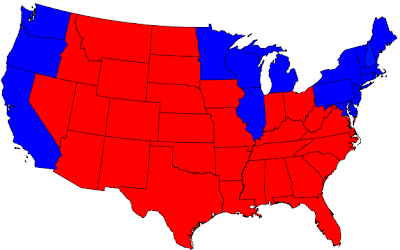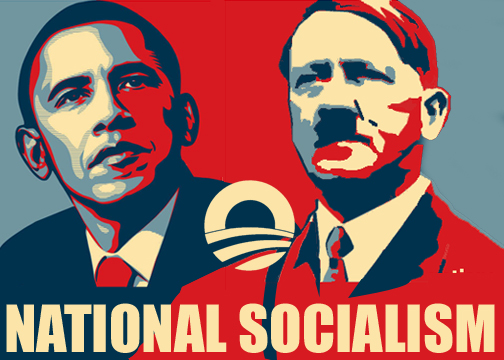
Health Care Reform In the United States
Conservatives and liberals in the United States are ripping each other apart over mandatory insurance and public funding. Obama must be content in taking small steps to reform health care because Congress cannot change America’s character.
Ted Kennedy never shied away from a battle. The Democrat loved the struggle, and he actually had a reputation as the "Lion of the Senate," and was also known as a master of compromise. Two weeks ago, his country buried him, as the only one of three brothers granted the privilege of growing old in America's brutal and occasionally murderous politics.
His spirit lives on. All of Washington held its breath this week as Barack Obama read aloud from his mentor’s last letter. It is “the great unfinished business of our society” to finally grant to every citizen of the world’s richest country a right to health care. The posthumous exclamation reminded Congress of what is at stake. Kennedy wrote that it is a matter of "fundamental principles of social justice" and ultimately even the "character of our country."
It says plenty about the political culture of a nation when it needs help from a dead man to stop for a moment the trench warfare and the rituals of battle. Ted Kennedy asked the United States a question about character: How united does this society want to be, and how much community can be afforded by a nation whose founding myths are explained mostly by boundless freedom and an eternally proud, mostly heroic, and only rarely nefarious individualism?
Many presidents have worked very hard to try and force a reasonably unanimous answer about this from the people. Teddy Roosevelt, Harry Truman, and Bill Clinton all failed. Now Obama wages his reform, and there are already 47 million people without insurance coverage. This is deadly since 18,000 men, women and children die every year in the United States because they do not have insurance and dread going to see the doctor. These numbers mean that two people die every hour; or when put in terms the nation can understand, this is six times the number of people killed in the September 11th attacks.
Intolerable Close Combat
No European society could politically tolerate such numbers. Not even the Germans. Certainly, every four years millions of Germans fall into despair over the miserable boredom of Teutonic election campaigns. But every form of civilian warfare, in which the Americans massacre each other over the most mundane details of their health care reform, would not be tolerated in Germany. Just imagine: In Quakenbrück or Hoyerswerda, opponents of Merkel coming to a gathering with a loaded gun. In Flensburg, Stendal and Rosenheim shouting down government protesters one time as Nazis and another time as Communists. Or anywhere else, a voter showing up at a town hall meeting as an “extreme right wing terrorist,” whereupon the representative in attendance would say to him, “God bless you, Amen.”
This is how things are in America, the one over which Barack Obama now presides. The country is not struggling over finishing the bloody wars in Iraq and Afghanistan, because it only knows patriots. No, the Right and the Left are ripping each other to pieces over mandatory insurance and public funding. In the process, both sides are unrestrained, with complete devotion and hatred. This is because they do not see the neighbor or the fellow citizen in the political opponent. They only see the other America, the one they want nothing to do with.
The Political Balkanization of the United States
No politician has characterized the internal division of his native country as eloquently and pointedly as Barack Obama. His oratory since 2004 about the United States, which was then threatening to disintegrate into a red (Republican) America and a blue (Democrat) America, was the beginning of the journey which led him into the White House in January 2009. And still, this sermon-izer and consensus politician was strangely surprised, and actually caught off guard, when the cultural war broke out in August over “Obama-Care" and how to pay for it. In the process, he came face to face with something about which he had always warned: the political balkanization of the United States.
Separate Ways
Half of all Americans live in electoral districts which always vote red (Republican) or blue (Democrat) by margins of twenty percent or more. Millions of Republicans and Democrats do not talk with “the others,” even if they run into them face to face. They worship in different churches, go their separate ways in restaurants and stores, and use the Internet or ideologically rigid cable television channels to follow the news stories which fit into their view of the world.
The inclination to escape into the subcultures of the Right or the Left actually increases with a higher educational level. Whoever went on to study is now earning more, and can afford more, and will choose to live in a residential suburb, join a country club, and send their children to the best schools.
The dream that the election of a black newcomer could make people forget about the old ways was always naïve. This illusion is cracking now that the town hall meetings are picking up steam and a conservative heckler in Congress has accused the president of being a liar. There is no bipartisan coalition behind Obama, the prophet of change. In contrast, his program of social and environmental renewal of the global power is allowing the society to take positions along the traditional front lines. No, that broad, diverse, neighborly, and pro-American coalition which Obama so willingly invoked as the true "United States" does not exist. The task he currently faces as president, on the contrary, is this: Obama must work diligently every day to win back those Americans who are turning against him and are now opposing his agenda.
No Turn to the Left
Obama is now trying to do this. He is becoming more modest and more calculating. He wants to leave the socially conservative and evangelical America alone. But possibly, he will need the moderate Republicans and those voters who now, in view of the fundamental decline of the Republican Party, consider themselves to be Independents. These people are not in favor of a turn to the Left. They are troubled by Big Government and its never-ending power grab. For Europeans, a fear such as this is incomprehensible. The moderate Republicans and Independents look in horror at how Obama saved the large banks and the automakers, and how he is driving up the national debt.
Obama was forced to take on a repair job in the financial and economic crisis. Now, he would like to shape the future, and mold the society according to his vision, but he does not have the money to do it. Only eight months after his inauguration, he must win the Americans over to his side once again. He wants to carry them along, so he can then start taking very small steps with very pragmatic reforms.
America’s character cannot be changed in Congress. Ted Kennedy told Obama this from his deathbed. The old man never forgave himself for rejecting an offer from Richard Nixon for a modest buildup of health insurance. Kennedy wanted everything and got nothing. Obama vowed to his mentor that he would not repeat this mistake.


